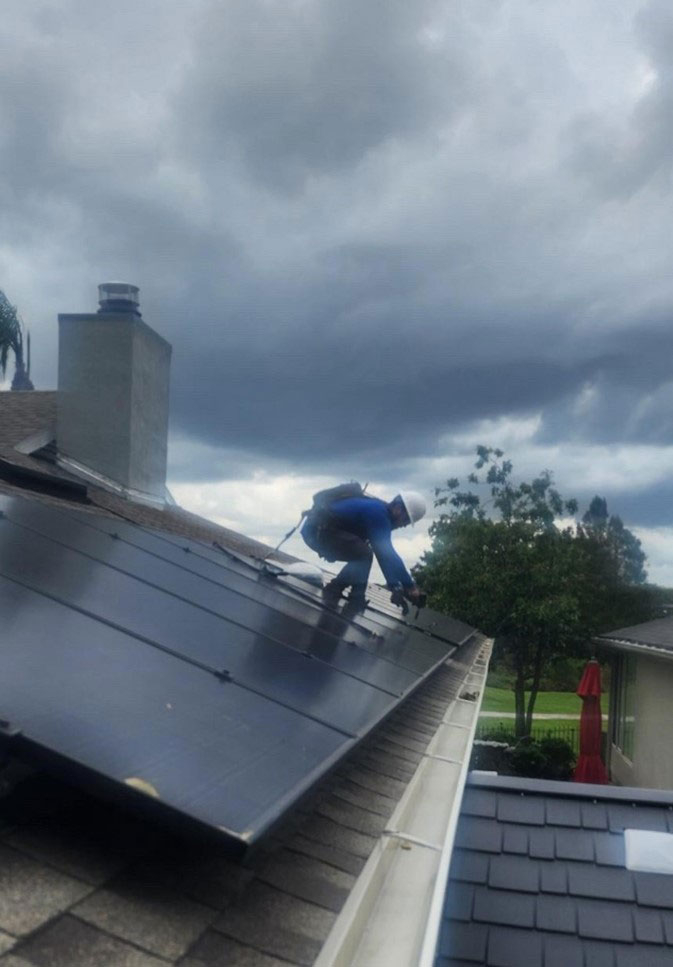Sign up for daily news updates from CleanTechnica on email. Or follow us on Google News!
As we went through Hurricane Milton down here in Southwest Florida, and particularly as the roofs all over my neighborhood got torn up, I and many others wondered: how well do rooftop solar systems survive in a hurricane here?
While I’ve seen the shingles ripped off many a roof from Milton, I’ve get to see a destroyed or even slightly harmed rooftop solar PV system. True — we don’t have nearly enough rooftop solar here in The Sunshine State. Still, my impression is that rooftop solar PV systems fared quite well.
Sunnova Energy International is now backing up that claim. The “industry-leading adaptive energy services company” reports that 98% of its rooftop solar systems were completely unaffected by the strong winds of Hurricane Milton and Hurricane Helene. That seems like a pretty good result. While I can’t say that I think 1 out of 50 systems being affected is great, I presume there are cases where the roofing wasn’t up to snuff or the installation work wasn’t done great or the property just got smashed by a truly severe wind. In any case, a 98% chance your solar PV system doesn’t have a blemish or a crack from a hurricane (or two) is quite good.
“Sunnova systems remained intact for approximately 19,000 customers in Florida during Hurricane Milton, and more than 13,000 customers across the U.S. Southeast during Hurricane Helene when power infrastructure was crippled and unable to deliver electricity to residents,” the company writes. “In total, Sunnova systems for more than 100,000 customers in hurricane-affected areas, including Puerto Rico and Texas, this season have experienced no material damage.”

Also, even in a case where your system is affected, Sunnova is there to help. “Whether a hurricane or simple system issue, Sunnova offers an industry-leading 25-year service guarantee to all residential solar customers through Sunnova Protect™,” the company adds.
Furthermore, of course, many Sunnova customers benefitted from having solar plus batteries. That’s the point of the tech pairing. “Sunnova solar + storage customers living in the hurricane-affected areas benefitted from battery power for an average of 25 hours in the seven days after Hurricane Milton’s landfall. Similarly, Sunnova solar + storage customers benefitted from battery power for an average of 26 hours in the aftermath of Hurricane Helene in the following seven days following the storm while millions of people were without power.”
Having an extra day and night of electricity when most people have lost power is often just what’s needed. In Florida especially, utility companies are heavily prepped for going out and restoring power, and solar+battery backup for 25–26 hours is plenty to make sure you’re not tossing food from your fridge and freezer or having to suffer through non-AC life in a state that was barely inhabited before AC was invented (for obvious reasons).
I know some people are concerned that a rooftop solar PV system could get ruined in a hurricane, but the reality is that such systems are 98% likely to go unharmed and also make a world of difference (with battery backup) in the much more likely case that you lose grid power.
“When extreme weather hits we are all made acutely aware of the vulnerabilities of a centralized grid and transmission system,” says Paul Mathews, Chief Operating Officer at Sunnova. “We provide a valuable alternative solution in the form of a dependable, resilient off-grid power solution backed by industry-leading service to ensure performance in the most demanding of environments.” Indeed. True facts.

Chip in a few dollars a month to help support independent cleantech coverage that helps to accelerate the cleantech revolution!
Have a tip for CleanTechnica? Want to advertise? Want to suggest a guest for our CleanTech Talk podcast? Contact us here.
CleanTechnica uses affiliate links. See our policy here.
CleanTechnica’s Comment Policy




